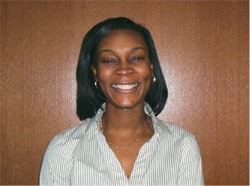Q&A with Danielle Green-Byrd, a former Notre Dame basketball star who lost her left hand while serving in Iraq and is now an assistant sports coordinator for Chicago public schools.
 Danielle Green-Byrd
Danielle Green-Byrd
Q: How did you develop an interest in attending Notre Dame? A: I don't come from the healthiest of families. It's a little dysfunctional. I just knew that I didn't want to continue the cycle. I wanted to be different - somehow, some way. I had watched Notre Dame football on TV and thought, "There must be something special about this place." I went on my recruiting trip and felt if I didn't commit that weekend that they would give my spot to someone else. I didn't want to have any regrets in my life about not being able to fulfill my dream.
Q: Do you have any regrets about your military service? A: It's something that I always wanted to do - to be a soldier and wear my uniform with pride. Yeah, my life is different, but I'm alive.
Q: Do you think athletes make better soldiers than non-athletes? A: I do think I was mentally tougher than a lot of the females. I think a lot of my mental toughness came from my years at Notre Dame, and it carried over to the military. Plus, I was in shape. People who rescued me were like, "The only reason you made it is because you were mentally tough and physically fit."
Q: Are there similarities between being a member of a sports team and being a member of an Army unit? A: Teamwork. I knew that to play a team sport you have to be a team player, but it's so much more the case in the military than on any basketball court I ever played on. We're talking about life or death. If my comrades didn't have my back, I would be dead right now.
Q: How do you see the rest of your life unfolding? A: I'm in grad school now. I would like to be an academic advisor for student-athletes, helping them make the transition from high school senior superstar to college freshman. And I can work with college seniors to help them make the transition to the real world. With my life experiences alone, I think I can help student-athletes. Once I get my Master's degree, I think I can pave my own road.





































